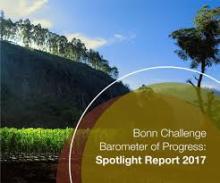Land Library Search
Through our robust search engine, you can search for any item of the over 73,000 highly curated resources in the Land Library.
If you would like to find an overview of what is possible, feel free to peruse the Search Guide.
/ library resources
Showing items 1 through 9 of 305.This profile provides an overview of climate risk issues in Azerbaijan, including how climate change will potentially impact agriculture, water resources, human health, tourism, and coastal resources and infrastructure.
Peatlands are carbon-rich ecosystems that cover just three per cent of Earth's land surface, but store one-third of soil carbon. Peat soils are formed by the build-up of partially decomposed organic matter under waterlogged anoxic conditions.
European agri-environmental schemes are being criticised for reinforcing rather than negating an opposition between agricultural production and environmental production, and for assuming instead of securing a public willingness to pay for agri-environmental change.
These provisions lay down some amendments to the Industrial Emissions (Integrated Pollution Prevention and Control) Regulations as regards coordination of the Malta Environment and Planning Authority with other competent authorities.
These Regulations amend the Industrial Emissions (Framework) Regulations as regards the requirements for certain categories of installations, combustion plants, waste incineration plants or waste co-incineration plants in general binding rules that the Malta Environment and Planning Authority may
The Bonn Challenge is a global effort to bring 150 million hectares (Mha) into restoration by 2020 and 350 Mha by 2030.
Ecological restoration is a suitable tool to revert land degradation in semiarid areas. Social participation is increasingly considered as a guarantee for the long-term success and sustainability of restoration projects.
The dominant agricultural model, based on the abusive and destructive use of natural resources, leads us into a health, social, ecological, climatic, economic and cultural impasse.
El modelo agrícola dominante, basado en un uso abusivo y destructor de los recursos naturales, nos va a llevar a un apuro sanitario, social, ecológico, climático, económico y cultural.







